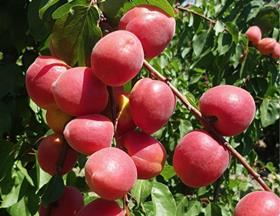
South African stonefruit growers are now taking time off to consider their plans for the 2019/20 season, against the background of another fairly disappointing crop in 2018/19.
On top of this, as was the case with table grape growers, they have found markets to be tough going.
One of the country’s leading plum exporters, Jan Hoon from Franshhoek Marketing, said the plum crop was at least 15 per cent lower than in the previous season when growers also had to confront the effects of the drought.
“In this past season we were between 40 per cent and 50 per cent down on what would have been a normal crop,” Hoon outlined. “Comparing to the previous season when we were already substantially down, is no good.”
For the record, all stonefruit categories had another tough season. “If it was not for an exchange rate which helped us somewhat, we would have been in a far worse situation,' he confirmed.
However, the nature of South Africa's stonefruit growers is such that they are now already facing up to the new season. “We are now in the rainy season and we hope that we get plenty more rain. The water situation is however much better than the same time last year and as soon as the trees blossom, new confidence normally kicks in.”
It would seem that although the early and mid-season was difficult, South Africans are finding more success in the late season, and by focusing on niche products.
Hans Christiaan Muylaert-Gelein, CEO of Fruit’s Unlimited, a South African stonefruit specialist, said that his company was working on this.
In the mid-season he predicted that the South African plum crop could drop by almost as much as 3m cartons year. This prediction more or less came true – with 8.7m cartons exported compared to 12.3m cartons in 2017, the last non-drought affected season.
“For us the good news is that the Fruits Unlimited growers are only getting into third gear after the peak mid-season,' Muylaert-Gelein continued. 'This year we had a few strong weeks with the new varieties Midnight Gold and Polaris, which were shipped in week 3 and week 4.
“In week 5 we saw the first commercial volumes of Honey Punch, which was described in our tastings as ‘the best cultivar in the past 16 years of imported varieties',' he said. “Those who tasted it talked about the unique aroma, fantastic red flesh and that is was a clear winner amongst plums.
“We are constantly trying to improve our stonefruit business and what better way than to improve eating quality for the satisfaction of our clients as well as the consumer,” Muylaert-Gelein noted. “There are several ways to do this, for instance the development of new improved varieties, but one very important but often neglected option, is to seek the best a combination of naturally nutrient balanced soil, slope and micro climate.'
Hoon said that, in his opinion, there were not yet sufficient new varieties to make a significant difference in the offer at a marketing level.
“Most new developments are in the Karoo where we also had much problems with the drought,' he added. 'We have managed to substantially increase the eating quality of our fruit over the past few years. We are now producing better eating fruit than our competitors.”
The next season, towards the end of the year, will start at the same time as Brexit due to happen. Whether it is a hard Brexit or soft one, does not really concern the South Africans that much. They are confident that in time it will turn out well, with perhaps a benefit being a more stable market in the UK with less cross channel trading and movement of fruit which destabilises the market.



